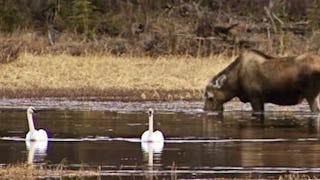Filter by
SubjectRequired
LanguageRequired
The language used throughout the course, in both instruction and assessments.
Learning ProductRequired
LevelRequired
DurationRequired
SkillsRequired
SubtitlesRequired
EducatorRequired
Explore the Environmental Economics Course Catalog
 Status: Free Trial
Status: Free TrialUniversity of Michigan
Skills you'll gain: Sustainable Development, Sustainable Business, Environmental Policy, Environmental Regulations, Environmental Resource Management, Environmental Social And Corporate Governance (ESG), Climate Change Mitigation, Cost Benefit Analysis, Natural Resource Management, Economics, Oil and Gas, Policy Analysis, Market Dynamics, Public Policies, Decision Making

University of Illinois Urbana-Champaign
Skills you'll gain: Environmental Policy, Sustainable Development, Environment, Water Resources, Demography, Energy and Utilities, Environmental Science, Environmental Resource Management, Sustainability Standards, Sustainable Engineering, Water Resource Management, Social Sciences, Climate Change Adaptation, Economics
 Status: Preview
Status: PreviewSkills you'll gain: Oil and Gas, Energy and Utilities, Climate Change Mitigation, International Relations, Environmental Issue, Electric Power Systems, Natural Resource Management, Environmental Policy, Economics, Political Sciences, Market Dynamics, Sustainable Development
 Status: Preview
Status: PreviewLund University
Skills you'll gain: Sustainable Business, Sustainable Design, Sustainable Development, Corporate Sustainability, Environment and Resource Management, Materials Management, Business Modeling, Environmental Science, Waste Minimization, Drive Engagement, Supply Chain Management, Environmental Policy, Business Analysis, Innovation, Policy Analysis, Policy Development
 Status: Free Trial
Status: Free TrialDartmouth College
Skills you'll gain: Environment, Environmental Issue, Environmental Science, Sustainable Development, Biology, Hydrology, Water Quality, Systems Thinking, Water Resource Management, Energy and Utilities, Physics, Climate Change Mitigation, Chemistry
 Status: Preview
Status: PreviewErasmus University Rotterdam
Skills you'll gain: Economics, Policy, and Social Studies, Economics, Socioeconomics, Sustainable Development, Policy Analysis, Data Analysis, Tax, Environmental Issue, International Relations, Trend Analysis, Investments, Policy Development, Behavioral Economics, Supply And Demand, Data Collection
What brings you to Coursera today?
 Status: Preview
Status: PreviewTechnical University of Denmark (DTU)
Skills you'll gain: Water Resource Management, Water Sustainability, Environmental Engineering, Stormwater Management, Environment and Resource Management, Sustainable Technologies, Civil Engineering, Water Quality, Sustainable Development, Environmental Policy, Waste Minimization, Cultural Sensitivity, Climate Change Adaptation
 Status: Preview
Status: PreviewUniversity of London
Skills you'll gain: Sustainable Business, Corporate Sustainability, Environmental Social And Corporate Governance (ESG), Reverse Logistics, Sustainable Development, Business Ethics, Sustainability Standards, Sustainability Reporting, Environmental Issue, Waste Minimization, Environmental Regulations, Logistics, Climate Change Mitigation
 Status: Preview
Status: PreviewThe University of North Carolina at Chapel Hill
Skills you'll gain: Environmental Laws, Environmental Policy, Environmental Regulations, Environmental Issue, Law, Regulation, and Compliance, Pollution Prevention, Environment and Resource Management, Risk Control, Water Quality, Water Resource Management, Legal Proceedings, Climate Change Mitigation, Case Studies
 Status: Preview
Status: PreviewUniversitat Autònoma de Barcelona
Skills you'll gain: Climate Change Adaptation, Market Dynamics, Supply And Demand, Economics, Climate Change Mitigation, Environmental Policy, Sustainable Development, Behavioral Economics, International Relations, Big Data, Cost Benefit Analysis, Environmental Regulations, Mathematical Modeling, Market Analysis, Tax Laws
 Status: Preview
Status: PreviewIESE Business School
Skills you'll gain: Sustainable Business, Corporate Sustainability, Environmental Social And Corporate Governance (ESG), Business Strategy, Sustainability Reporting, Environmental Issue, Strategic Thinking, Strategic Decision-Making, Compliance Management, Stakeholder Engagement, Consumer Behaviour
 Status: NewStatus: Free Trial
Status: NewStatus: Free TrialUniversity of Illinois Urbana-Champaign
Skills you'll gain: Diagnostic Tests, Immunology, Infectious Diseases, Cost Management, Laboratory Testing, Preventative Care, Cost Benefit Analysis, Data-Driven Decision-Making, Microbiology, Decision Making
Environmental Economics learners also search
In summary, here are 10 of our most popular environmental economics courses
- Environmental Economics: University of Michigan
- Introduction to Sustainability: University of Illinois Urbana-Champaign
- Politics and Economics of International Energy: Sciences Po
- Circular Economy - Sustainable Materials Management: Lund University
- Environmental Science: Dartmouth College
- Earth Economics: Erasmus University Rotterdam
- Global Environmental Management: Technical University of Denmark (DTU)
- Business Sustainability in the Circular Economy: University of London
- Introduction to Environmental Law and Policy: The University of North Carolina at Chapel Hill
- Economía del Cambio Climático: Universitat Autònoma de Barcelona










